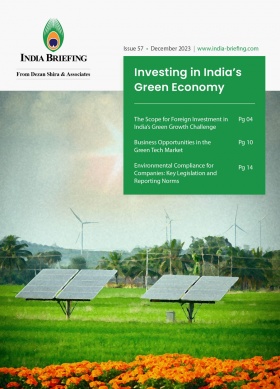India’s Industry and Trade Promotion Body Releases Year-End Report for 2023
In its year-end report for 2023, DPIIT, India’s trade & industry promotion body, highlights key schemes and economic milestones facilitating the country’s investment climate. These include efforts to promote export-oriented production, reduce the compliance burden, expand the industrial base, expand startups’ and MSME access to finance, etc.
To elevate India’s global economic standing, India’s Department for Promotion of Industry and Internal Trade (DPIIT) has steered multiple ground-breaking initiatives to enhance the country’s manufacturing capabilities and global exports.
On December 26, it released the 2023 year-end report, highlighting significant achievements under various schemes, including the production-linked incentives (PLI) program, startup initiative, ease of doing business reforms, and Make-in-India 2.0.
Highlights for 2023: Achievements underling India’s robust economy
Production-linked incentives program
At the forefront of the DPIIT-led initiatives is the PLI program, targeting 14 key sectors, with a budgeted outlay of INR 1.97 trillion and aimed at creating a strong and diversified industrial base in India and to attract investments from global value chain leaders.
As of November 2023, 746 applications have been approved under the PLI Schemes, with units established in more than 150 districts across 24 states. Notably, over INR 950 billion worth of investment has been reported till September 2023, resulting in production/sales of INR 7.80 trillion and employment generation exceeding 640,000 jobs. The export sector has witnessed a substantial boost, with an increase of INR 3.20 trillion due to PLI-linked sectoral output. Incentives worth approximately INR 29 billion were disbursed in the fiscal year 2022-23 (April 1, 2022 to March 31, 2023).
Value addition of 20 percent has been achieved in mobile manufacturing within a span of three years. In FY 2023, out of the total electronics production amounting to US$101 billion, smartphones constituted US$44 billion, including US$11.1 billion in exports.
India’s telecom sector achieved a remarkable import substitution rate of 60 percent, making India nearly self-reliant in Antennae, GPON (Gigabit Passive Optical Network), and CPE (Customer Premises Equipment). The pharmaceuticals sector witnessed a significant reduction in imports of raw materials, with the local manufacturing of unique intermediate materials and bulk drugs, including critical substances like Penicillin-G. Moreover, technology transfer supported domestic production of medical devices such as CT scans and MRIs.
In the emerging drone sector, there has been a sevenfold increase in turnover, primarily driven by micro, small, and medium enterprises (MSME) startups. The PLI Scheme for Food Processing has positively impacted Indian farmers and MSMEs by increasing the sourcing of raw materials domestically.
Under the PLI Scheme for White Goods (ACs and LED Lights), 34 companies are investing INR 54.29 billion in air conditioner components and 30 companies are investing INR 13.37 billion in LED component manufacturing. Of these, 13 foreign companies have committed to investing INR 20.90 billion. Actual investments of INR 20.02 billion have been made by PLI beneficiaries up to March 2023, with an additional investment of INR 20.84 billion reported as of September 2023.
Startup India initiative
With a burgeoning startup ecosystem, India boasts over 114,000 DPIIT-registered startups spread across all 36 Indian States and Union Territories. Such a dynamic environment has fostered innovation and generated over 1.2 million jobs, boosting entrepreneurship and economic growth.
The Fund of Funds for Startups (FFS) Scheme has witnessed substantial government commitment, amounting to about INR 102.29 billion allocated to 129 Alternative Investment Funds (AIFs). These AIFs have further invested INR 172.72 billion in 915 startups, injecting vital capital into the entrepreneurial landscape. Additionally, the Startup India Seed Fund Scheme (SISFS) has seen the approval of INR 7.47 billion for 192 incubators, with selected incubators disbursing INR 2.91 billion to 1,579 startups.
To bolster financial support, the Credit Guarantee Scheme for Startups (CGSS) has been established, providing credit guarantees for loans extended by Scheduled Commercial Banks, Non-Banking Financial Companies, and AIFs. Operationalized on April 1, 2023, this scheme aims to mitigate financial risks for startups, encouraging greater participation in the entrepreneurial ecosystem.
More than 21,800 DPIIT-recognized startups have been seamlessly integrated into the Government e-Marketplace (GEM), receiving over 243,000 orders amounting to INR 185.40 billion. The GEM Startup Runway initiative expedites the onboarding process for startups on the platform, fostering efficiency and accessibility.
Under India’s G20 Presidency in 2023, the institutionalization of the Startup20 Engagement Group marked a significant milestone. This group serves to create a global narrative supporting startups and facilitating synergies among startups, corporates, investors, innovation agencies, and other key ecosystem stakeholders. The Startup20 Engagement Group, under India’s G20 Presidency, convened four meetings across different regions of the country, fostering collaboration and knowledge exchange.
Digital commerce and MSME-led growth under ONDC
An initiative by the DPIIT, the Open Network for Digital Commerce (ONDC) has become a robust platform, hosting over 230,000 sellers and service providers active across 500+ cities and towns in India. This extensive network facilitates seamless transactions and business operations, offering international investors a glimpse into India’s vast and interconnected market. In November 2023 alone, ONDC recorded over 6.3 million transactions across the country. Thus far, the ONDC digital commerce ecosystem has seen over 3000 Farmer Producer Organisations (FPOs) and around 400 Self-Help Groups (SHGs), micro-entrepreneurs, and social sector enterprises participate as Seller Network Participants. ONDC has introduced mobility services in Bengaluru, Mysuru, Kochi, and Kolkata, and conducted a pilot for exports, with Singapore becoming the inaugural market to engage with Indian sellers through the ONDC Network. Offerings under the ONDC network include the following categories: food & beverage and grocery, mobility, fashion, beauty and personal care, home & kitchen, electronics and appliances, health & wellness, and B2B.
Promoting region-specific products and expanding retail footprint
The One District One Product (ODOP) is a transformative initiative designed to promote balanced regional development by championing locally crafted products in each district in India. With a strong emphasis on advocating for indigenous products, ODOP has identified over 1,200 unique items spanning 767 districts. These products are showcased on the ODOP portal and available for purchase on platforms such as GEM and other e-commerce channels.
In a significant stride towards supporting and showcasing ODOPs, Geographical Indication (GI) products, and various handicraft items, the Union Budget for 2023-24 had announced the establishment of Ekta/Unity Malls in the states, which would serve as dedicated spaces for the promotion and sale of these region-specific products, contributing to the overall economic growth of the states. An outlay of INR 50 billion has been budgeted in 50-year interest-free loans to the states under the ‘Scheme for Special Assistance to States for Capital Investment 2023-24’.This initiative is poised to reshape the retail and commercial landscape in these regions, and present opportunities for international investors and businesses.
Digitizing approvals and reducing compliance requirements
As a proactive measure to reduce the compliance burden and promote the Ease of Doing Business (EoDB) in India, a comprehensive initiative has been undertaken. Leveraging the data available on the Regulatory Compliance Portal, various Ministries/Departments and States/UTs have successfully decriminalized more than 3,600 compliances, while a substantial reduction of over 41,000 compliances has been achieved.
The Jan Vishwas (Amendment of Provisions) Bill, 2023, passed by the Parliament, marks a significant stride in this direction. This amendment proposes the decriminalization of 183 provisions within 42 Central Acts administered by 19 Ministries/Departments, signaling a commitment to creating a more business-friendly legal framework.
States and Union Territories are actively participating in the Business Reform Action Plan (BRAP), where they are assessed based on designated reform parameters, including Investment Enablers, Access to Information and Transparency, Online Single Window System, Land Allotment, Construction Permits Enablers, Labor Regulation Enablers, Environmental Registration Enablers, Inspection Enablers, Obtaining Utility Permits, Contract Enforcement, and Sector-specific reforms. The forthcoming release of the BRAP 2022 report will shed light on the progress achieved in these areas.
Aligned with ease of doing business reforms, the government is taking strategic steps toward centralized Know Your Customer (KYC) and Permanent Account Number (PAN) as a Single Business Identity. This initiative, coupled with Regulatory Impact Assessment, aims to boost foreign direct investment (FDI) in the country and foster domestic manufacturing activities.
National Single Window System (NSWS), a cornerstone of these reforms, simplifies processes by offering a unified platform for Government-to-Business (G2B) clearances across various Ministries/Departments. It effectively reduces duplication by auto-populating form fields based on investor profiles. Presently, NSWS provides approvals from 32 Central Ministries/Departments and 25 States/UTs. Processing over 255,000 approvals as of November 2023, the NSWS platform facilitates efficient governance and provides a clear pathway for international businesses seeking to navigate the complex regulatory landscape.
International investment outreach via Invest India
To drive investment outreach, a multifaceted approach is being employed, involving Ministries, State Governments, and Indian Missions abroad. The identification of potential investors, coupled with comprehensive handholding and investment facilitation, is being efficiently handled by Invest India. These initiatives collectively aim to attract investments, stimulate growth, and reinforce India’s position as a global manufacturing hub.
Make-in-India 2.0
Following its inception in 2014, the Make in India initiative is now in Phase 2.0, with a strategic focus on 27 key sectors. The DPIIT is spearheading the coordination of Action Plans for 15 manufacturing sectors, while the Department of Commerce is overseeing 12 service sectors.
To leverage India’s industrial strengths and competitive advantages, DPIIT is closely collaborating with 24 sub-sectors. The selection criteria for these sub-sectors include considerations such as import substitution, export potential, increased employability, and aligning with the strengths of Indian industries. The identified sub-sectors include furniture, air-conditioners, leather and footwear, ready-to-eat products, fisheries, agri-produce, auto components, aluminum, electronics, agrochemicals, steel, textiles, electric vehicle components, integrated circuits, ethanol, ceramics, set-top boxes, robotics, televisions, closed-circuit cameras, toys, drones, medical devices, sporting goods, and gym equipment. The collaborative efforts are geared towards fostering holistic and coordinated growth across these sub-sectors.
Logistics reforms
The Unified Logistics Interface Platform has integrated with 35 systems of eight Ministries, covering 1800+ fields. This integration intends to reduce complexities for international businesses engaged in cross-border trade.
India’s logistic costs ranged between 7.8 percent and 8.9 percent of the GDP during 2021-22, down from 8.7-9.9 percent during 2011-12, the New Delhi-based economic think tank National Council of Applied Economic Research (NCAER) said in a report written for the DPIIT and released December 14, 2023.
Growth of industrial production
Finally, industrial production as measured by the Index of Industrial Production (IIP) expanded by 6.9 percent during April-October 2023-24 over the corresponding period last year on the back of broad-based growth. All three sectors—mining, manufacturing and electricity—recorded robust growth during the period at 9.4 percent, 6.4 percent, and 8 percent, respectively.
About Us
India Briefing is produced by Dezan Shira & Associates. The firm assists foreign investors throughout Asia from offices across the world, including in Delhi and Mumbai. Readers may write to india@dezshira.com for more support on doing business in India.
We also maintain offices or have alliance partners assisting foreign investors in Indonesia, Singapore, Vietnam, Philippines, Malaysia, Thailand, Italy, Germany, and the United States, in addition to practices in Bangladesh and Russia.
- Previous Article India’s Antitrust Regulator CCI Circulates Draft Rules on Determining Company Turnover
- Next Article Recent Changes to Form 10F: A Guide for Non-Residents Seeking to Claim DTAA Benefits in India









